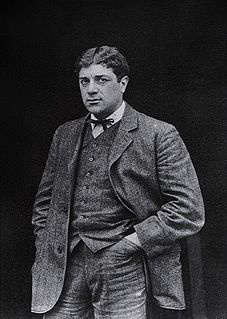A Quote by Edward Bulwer-Lytton, 1st Baron Lytton
Art itself is essentially ethical; because every true work of art must have a beauty or grandeur of some kind, and beauty and grandeur cannot be comprehended by the beholder except through the moral sentiment. The eye is only a witness; it is not a judge. The mind judges what the eye reports to it; therefore, whatever elevates the moral sentiment to the contemplation of beauty and grandeur is in itself ethical.
Related Quotes
The poetical impression of any object is that uneasy, exquisite sense of beauty or power that cannot be contained within itself; that is impatient of all limit; that (as flame bends to flame) strives to link itself to some other image of kindred beauty or grandeur; to enshrine itself, as it were, in the highest forms of fancy, and to relieve the aching sense of pleasure by expressing it in the boldest manner.
I couldn't portray a women in all her natural loveliness.. I haven't the skill. No one has. I must, therefore, create a new sort of beauty, the beauty that appears to me in terms of volume of line, of mass, of weight, and through that beauty interpret my subjective impression. Nature is mere a pretext for decorative composition, plus sentiment. It suggests emotion, and I translate that emotion into art. I want to express the absolute, not merely the factitious woman.
The experience of beauty is in the eye of the beholder, as they say. The artist's relation to the object of beauty, how the art makes that happen, is a whole other subject. Beauty is an event. Beauty is something that happens. There is no such thing as a beautiful object or a beautiful woman. These things do not come near it - the experience of beauty, the event of beauty. The anxiety about it is what makes it such a central concern of culture and makes us so interested in it.
Whoever accepts the higher mission of art and comes nearer and nearer to it through his creative activity, will then go on from art to the Spirit deep within his own self... The philosophic search for enlightenment and the artist's search for perfection of work can meet and unite. Art can be a path to spiritual enlightenment but not to complete and lasting enlightenment. It can be born out of, and can give birth itself to, only Glimpses. For art is a search for beauty, which by itself is not enough. Beauty must be supported by virtue and both require wisdom to guide them.
The refining influence is the study of art, which is the science of beauty; and I find that every man values every scrap of knowledge in art, every observation of his own in it, every hint he has caught from another. For the laws of beauty are the beauty of beauty, and give the mind the same or a higher joy than the sight of it gives the senses. The study of art is of high value to the growth of the intellect.
In spite of all the refinements of civilization that conspired to make art--the dizzying perfection of the string quartet or the sprawling grandeur of Fragonard's canvases--beauty was savage. It was as dangerous and lawless as the earth had been eons before man had one single coherent thought in his head or wrote codes of conduct on tablets of clay. Beauty was a Savage Garden.






































